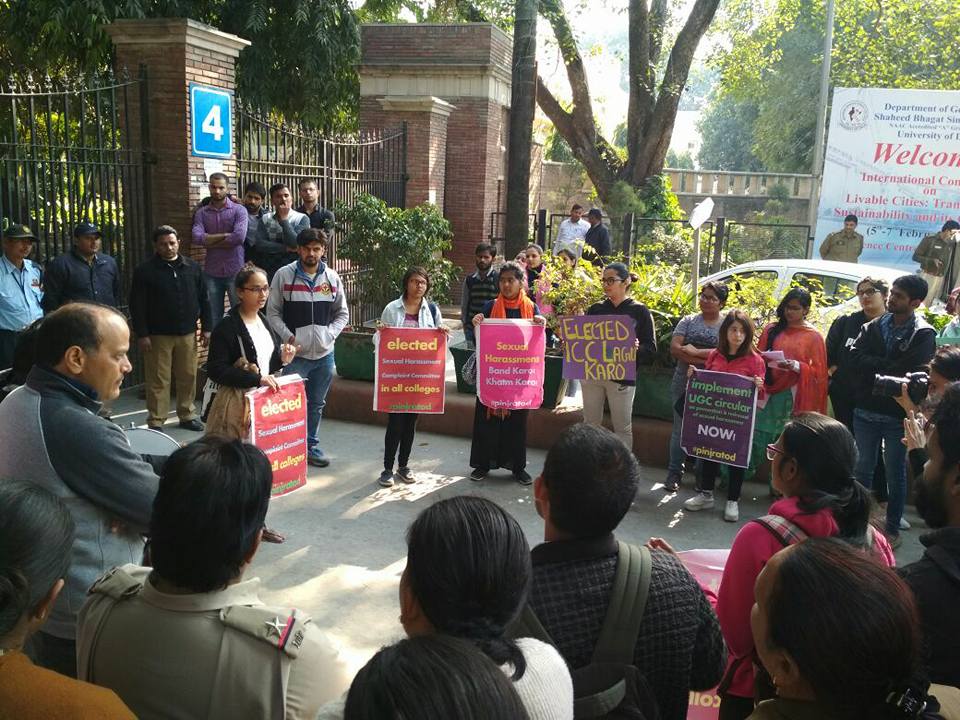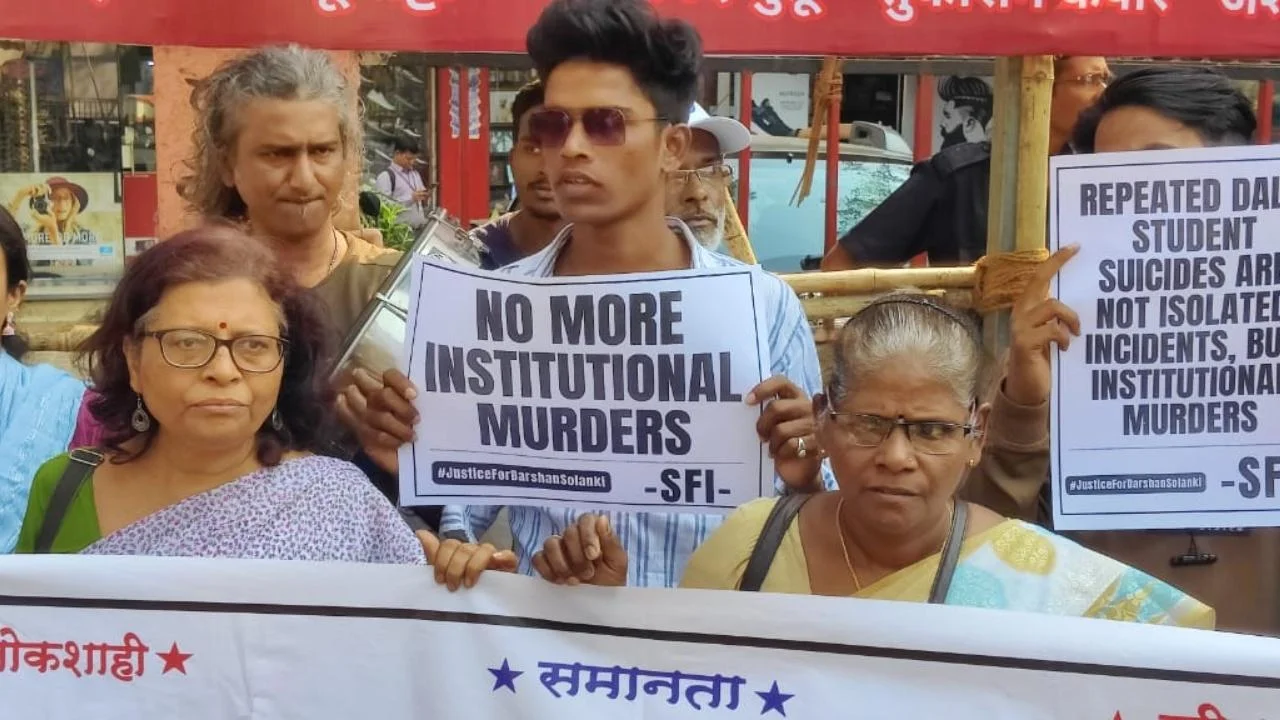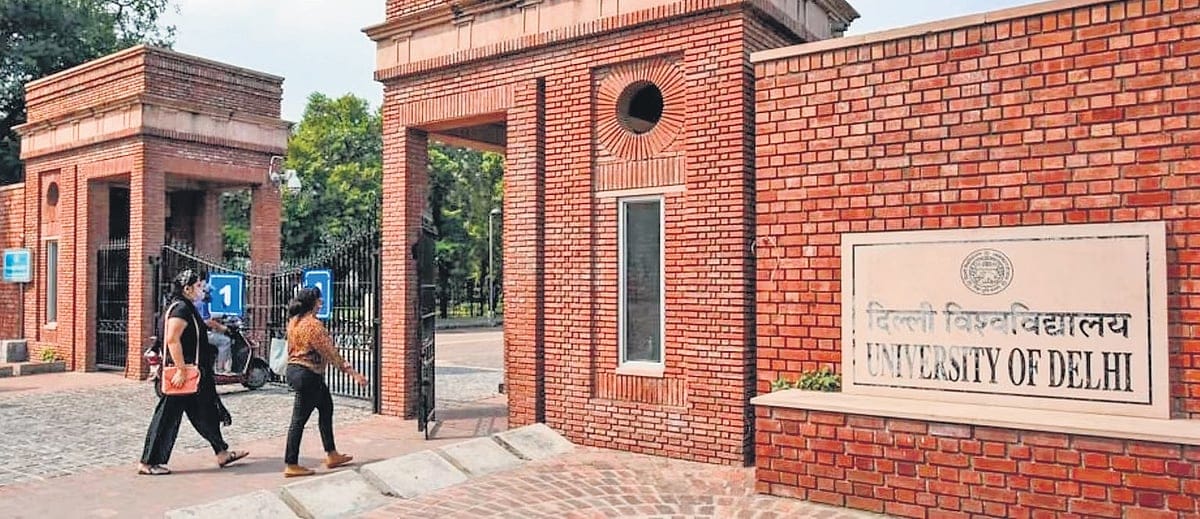Posted by NL Team
Pinjra Tod, a students’ collective that has been fighting for setting up of Internal Complaints Committees (ICCs) across DU colleges for three years now, escalated their fight on Wednesday at a gathering outside the Arts Faculty building. The protest came in the backdrop of two sexual harassment incidents that were reported in two DU colleges. The protesters urged for zero tolerance against sexual harassment and demanded autonomous and elected ICCs across all colleges.
Taking note of the point that “Sexual harassment is an act of power” and these power relations make students vulnerable in university spaces, DU had implemented a policy called Ordinance 15(D): Prohibition and Punishment for Sexual Harassment in 2003 which ensured that the complaint committees were independent of executive authorities. However, the policy was scrapped in 2013 and all higher education institutions were asked to form an Internal Complaints Committee (ICC) as per the 2015 guidelines of the University Grants Commission (UGC). But, contrary to the earlier ordinance where the members were elected, the UGC guideline gives the power to college/university’s apex authority to nominate the ICC members.
During the protest, students spoke about how their colleges do not have any elected student and faculty representatives within these committees and how principals constantly violate the autonomous mandate of such bodies. The protesters also noted the lack of active sensitisation on campuses.
“After years of fight, the Hindu College held its first ICC election this year. And when we asked for case hearings, the administration said: ‘Why are you talking about hearings and all now? You have got an ICC, right?’,” Ritika Thakur told Newslaundry while explaining why such bodies have to be independent of administrative interventions.
Students from Daulat Ram College (DRC) spoke about how in the absence of an ICC, when a complainant approached the principal, she retorted saying, ‘I trust my teachers and now get out of my room’. Similarly, in the Bharati College case, where no ICC exists, the complainant was forced to write an open letter to the vice-chancellor, after the principal threatened to throw her out of the college.
Although the ICC clause says that you need to have three elected students, the ambiguity about conduction of student elections has been considered as a major reason for students’ ignorance about the committee. The situation is no different in colleges like Ramjas, Kirori Mal and Miranda though they claim to have complaints committees that enjoy credibility and have a history of fighting sexual harassment.
Abhinash DC, a student of Ramjas, spoke about the election experience in his college. “All of a sudden, the college had put out a notice about holding an ICC election. Since there was only one boy in the nomination list, he got elected by default. Then the teacher who was looking over the processes randomly picked up two girls’ names and they were ‘elected’ as ICC members. Nobody knows who these students are,” said Abhinash.
By stressing on the autonomy and constitution of election-based ICCs, Pinjra Tod is indirectly asking for amendments to the 2015 UGC regulation.
Who needs to be sensitised first?
Manoj Kumar, DU’s deputy proctor was sent, on the university’s behalf, to speak to the protesters. More than anything else, the conversation revealed Kumar’s ignorance about the issue of sexual harassment and redressal mechanisms.
When Kumar was invited to address the students, referring to the recent sexual harassment incident reported in Bharati College, the proctor said: “We have asked the principal to investigate and also “requested” all colleges to constitute ICCs. Students confronted him and said: “Requesting is not your job, it’s ours. Instead, you have to ‘implement’ the guidelines using the power you have.”
As he went on talking about the incident at DRC and mentioned the arrest of the accused professor to ‘prove’ that they had taken a tough stance, students tried to make him understand the need to go beyond responses to individual cases in specific colleges. They said, “Sir, if there was a functional ICC in place conducting gender sensitisation, these things wouldn’t have happened and we wouldn’t have been sitting here,” shouted Devangana Kalita, one of the protesters.
When Subhashini Shriya, a student from the Law Faculty, referred to the giant size of an ICC hoarding in JNU (pointing at the importance given to ICCs), Kumar responded: “We will direct every college to have very big and visible hoardings”. When students screamed: “Sir, it’s not about the size,” Kumar replied: “But, you were talking about the size, right?”
Avantika Tewari, an MA student, also pointed out the utter negligence of DU authorities towards their three-year-long fight raising the same demand. She said, “We submitted n-number of memorandums, marched and protested; sometimes inside the gate, sometimes outside.” The proctor cut her off and asked, “But, did anyone stop you from coming inside?”
Clearly, before the varsity sets out to sensitise students and constitute sexual harassment complaints committees, they need to prepare a module for its own staff members to understand what constitutes sexual harassment, how serious it is and ways to address it.
However, a meeting has been fixed with the university’s chief proctor on February 13 to discuss the memorandum that was submitted by the protesters.
Originally published by Newslaundry, this piece is part of our series #MakeMyCampusSafe in collaboration with Newslaundry.
Featured Image Credit: Pinjra Tod
About the author(s)
Guest Writers are writers who occasionally write on FII.




